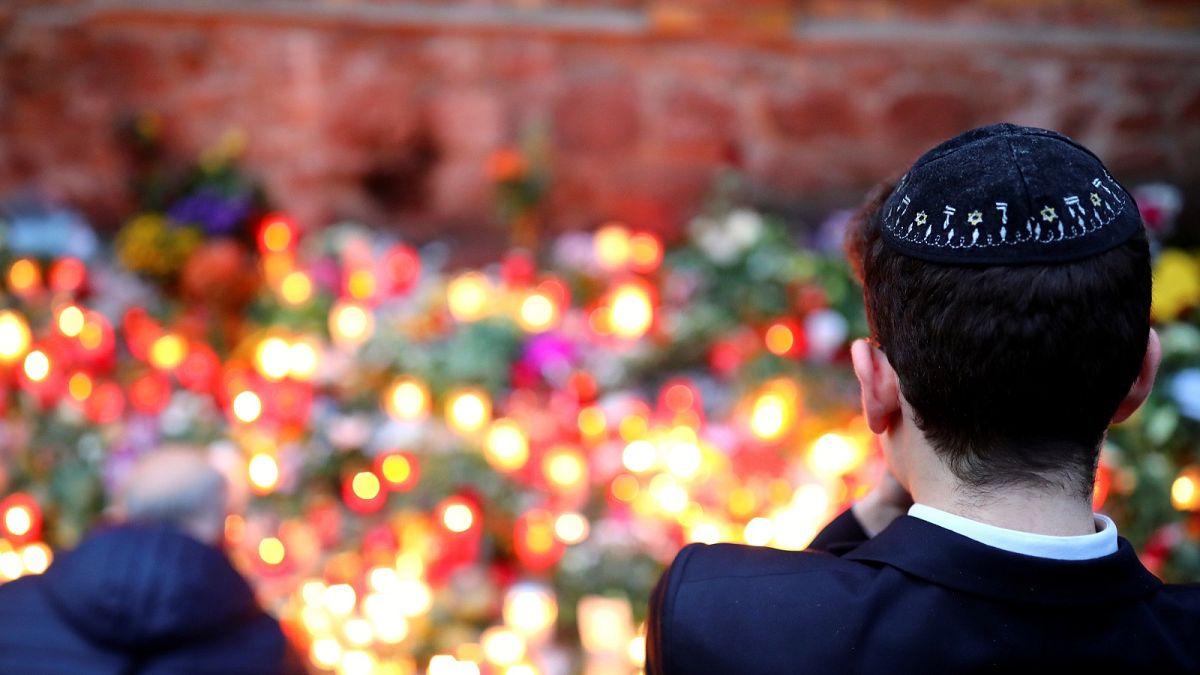Anti-Semitism in Europe didn't end in 1945. Last week’s attack on a synagogue in the German city of Halle is a painful reminder that across Europe, anti-Semitism is alive and well.
This may seem shocking to those outside our community who may happily believe that anti-Semitism is something that, in the Western world at least, ended in 1945. But last week’s attack on a synagogue in the German city of Halle is a painful reminder that across Europe, anti-Semitism is alive and well.
Despite being fortified (as is now common for synagogues, Jewish schools and even cemeteries across the continent) the gunman managed to kill two innocent Jews. German authorities have, as expected, promised to increase security in the aftermath of the attack. But that will do little to stop this hatred which, rather than fading in the face of modern European multiculturalism, is in fact emboldened by it - including by some of our mainstream politicians.
When carefully coded Jew hatred is allowed to permeate public life, is it any surprise that many Jews, like me, choose to push our identity deeper into our private lives and away from the limelight? All too often we only discuss anti-Semitism when it is undeniable and violent, for example after the recent attack in Halle. Although the culprit appears to be a Far-Right extremist, some were quick to circulate fake news that the attack was carried out by a Syrian refugee resident in Germany. It is this kind of speculation and suspicion of the “official story” that can tell us so much about the rise of anti-Semitism in the last few years, which is intimately connected to conspiracy theories about elites and media control.
Given the current populist mood across the political spectrum, anti-Semitic ideas can be easily dressed up as anti-establishment or anti-capitalist campaigns. The assumption that Jews like me are secretly in control of the capitalist establishment is almost always left unsaid. But unsaid is not the same as unheard.
This is not a fringe problem, confined to online alt-rightists or Islamist extremists. It could be argued that some of the continent’s biggest political parties - on both the right and the left - are complicit in Jew hatred to the point of being institutionally anti-Semitic. Most infamous at the moment is the UK’s Labour Party, which until recently I supported. Its leader, Jeremy Corbyn has developed a personality cult based on a cadre of hard left activists, many of whom were not even members of the party until his takeover.
As well as referring to Hamas and Hezbollah as his “friends”, Corbyn has overseen a climate of persecution against many Jewish parliamentarians, which has given MPs like Luciana Berger, and just this week Dame Louise Ellmann, no other recourse but to resign from the party. This has trickled down to grassroots supporters like myself, with me being regularly challenged to “prove” my loyalty, not only to the party but the country.
Officially, Labour has, of course disavowed this. Corbyn has regularly stated that he condemns “anti-Semitism and other forms of racism.” The wording of this carefully choreographed mantra can tell us a lot about modern anti-Semitism. It would sound absurd if a potential British prime minister condemned “violence against women and other acts of aggression against other genders” or “terrorism and other crimes.” The issues of violence against women and terrorism are rightly seen as serious enough to deserve their own dedicated condemnation. We would never ask them to share space with other, albeit related, issues.
Hatred towards Jews, it seems, has been lost in the mix. Visibility is key to the problem. Something rarely spoken about - both in the media and in private conversations - is that, unlike people of colour for example, Jews often have the option to hide their Judaism. Given recent events, many of them, like me, choose to conceal - or at least selectively reveal - their heritage. Just as Jews have become hidden, the animosity towards us has become easier to camouflage and deny.
That is, when denial is even necessary. When Conservatives like Priti Patel or Jacob Rees-Mogg talk of the “illuminati” or “metropolitan North London elites” many of their supporters will know at some level that they are talking about Jews. The language is so indirect, however, that the culprits can carry on doing business without even denying the implicit meaning of their words. Things are even more grim - and far less subtle - on the left.
For example, Salma Yaqoob, a friend of Corbyn, was recently re-admitted to the party despite ruthlessly attacking it until a few months ago, including a hate-filled campaign against Labour MP Naz Shah where Yaqoob’s campaign shamed her opponent for not wearing a hijab, and her campaigners even compared Shah to a dog.
Less well-known, however, is that Yaqoob’s supporters verbally attacked Shah at a campaign event. Their insult of choice? “Jew.” Yaqoob looked on, didn’t ask them to stop, and hasn’t clarified whether she agrees that “Jew” is indeed an insult.
Perhaps tired of being ignored by Corbyn, Jewish community leaders like the Board of Deputies of British Jews and the Jewish Leadership Council didn’t even ask him to respond. As Jewish individuals like me have started to become invisible, our community advocates have also started to retreat from public engagement.
If those who could potentially be a prime minister-in-waiting indulge anti-Semitism with political impunity, it will take much more than a security guard at the synagogue door to stop Europe’s new wave of anti-Semitism.
- Mike Bernstein is a British human rights campaigner
____________
Are you a recognised expert in your field? At Euronews, we believe all views matter. Contact us at view@euronews.com to send pitches or submissions and be part of the conversation.
